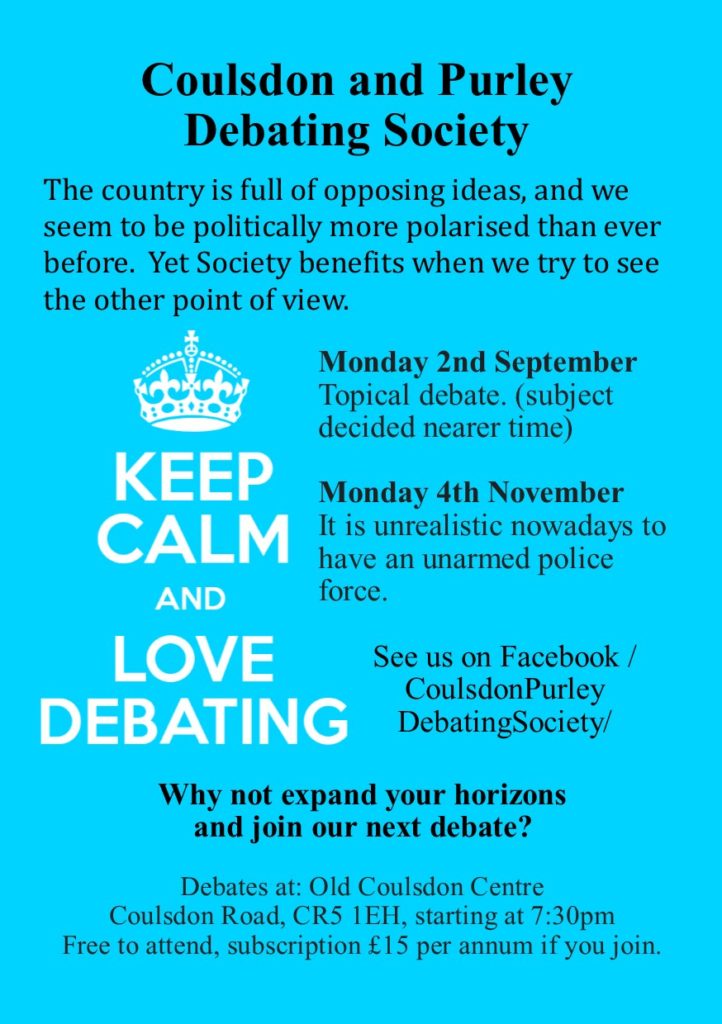The Coulsdon and Purley Debating Society held a debate in early September on the subject of “Priti Patel is right: it’s time to bring back the death penalty”. To be fair the Home Secretary had walked back that statement, but it was a good opportunity to discuss capital punishment.
The text below was originally written by Mike Swadling as a speech delivered to a live audience for the purpose of a debating society. Join them for their next debate on Monday 4th November, where the subject will be “It is unrealistic nowadays to have an unarmed police force”.
Other details from debate club nights can be found in CR5 Magazine.
Eye4eye
Deuteronomy speaks of an eye for an eye. But the principle predates the Old Testament and is first seen in Babylonian law. It is also seen in pre-Christian Anglo Saxon law.
Partly thanks to Ghandi people perceive this to be a retaliation rather than a reasonable punishment. The principle of an eye of an eye, started as a way to ensure punishment was measured and appropriate.
Goods taken would be return, and an injury would see a similar injury endured.
A death would be punishable by a death, not the wiping out of a family or clan, that was in ancient times, all too common.
That the punishment is proportional, in most societies was, and maybe still is a massive leap forward.
Indeed that fairness is engrained in most of us.
- If someone pick pockets from us, we don’t expect them to be battered or bruised (we might), but we expect some financial punishment or maybe some community service.
- If they break into our homes we expect some loss of freedom, some extensive community service or a short custodial sentence.
- If they attack us we expect a long punishing custodial sentence.
Therefore, I ask, who are we, if someone losses their life, to judge that the injury to them, should not be have a fair retribution?
I would like to emphasis here if someone loses their life, they not the friends and family are the primary wronged party.
Yes other feel the loss, but the real loss is the person whose life was cut short.
Why should they not be entitled to the same retribution from the law as any of us who suffered a lesser crime?
Wrong thinking
We often hear that because we have murders in places that have a death penalty it does work as a deterrent. It does, and I will come onto that.
But this idea that a punishment, any punishment deters all action, is something that we would apply in no other realm.
Who has ever heard:
- “If we just bring in a punishment for theft no one will ever steal anything”?
- “If we punish speeding, no one will speed”?
- “No one will evades tax, now we have fine for it”?
Indeed many here will have brought up children, I am sure we have all cared for some at some point.
We all know from this that once you set a boundary, no child ever breaks it.
Hold on is that not your experience?
Punishments do deter but don’t stop. Different punishments deter in different times and places in different ways. For instance different levels of crime and punishment may happen in different states in the US.
One with capital punishment may have more murders than one without, because, simply they are different places. In the developed world, most murders occur in cities.
In Australia the outback of the Northern Territory has some of the highest murder rates in the world. Why? Its remote, really remote, it’s the place criminals go to hide. It turns out they are still criminals, they commit murders. It’s a different place and simply, should be, no more be compared to Sydney, than the hill country of Texas is with the South Side of Chicago.
“Punishments work, and punishments deter crime. Today we are losing about an extra 330 people year than when we have capital punishment”
It works
Beyond the inherent fairness of capital punishment, Priti Patel is right. It is time to bring back the death penalty, because it works.
I agree with Nancy Reagan when she said:
“I believe that more people would be alive today if there were a death penalty.”
Or to quote President George W Bush:
“I don’t think you should support the death penalty to seek revenge. I don’t think that’s right. I think the reason to support the death penalty is because it saves other people’s lives”
I want to do a little thought experiment with you.
- Let’s say a new law in the UK meant murder would be punishable by death if committed on a Monday, Wednesday or Friday, but not if commitment on any other day of the week.
- Hands up if you think that would result on fewer murders, and keep in mind by its very nature, murder requires some premeditation. On a Monday, Wednesday or Friday than other days of the week?
- Of course it would hitmen, wronged lovers, gang members and maybe even some psychopaths would change the day they choose to commit murders, if this was the law.
In the UK we had capital punishment until it was abolished in 1965. Murders, are measured in rate per 100,000 people.
In Britain thanks to new ideas like Bobbies on the beat and new technology like fingerprints the murder rate started falling in roughly mid-1800s until the mid-1960s.
Thankfully murder is so low, that year or year rates fluctuate but trends can be seen.
We have more detailed statistics from 1900 where the decade saw a murder rate of 0.96 per 100,000. This fell gradually to 0.75 for the 1930, the era of the great depression. The rate rose slightly during and just after the war, but come 1959 it was down to 0.59 per 100,000.
In 1965 the rate was at 0.68, 1966, 0.76, 1974, 1.06.
What changed? What made the British suddenly so much more murderous?
Could it be? The death penalty was abolished in 1965 and had basically all but stopped being used a few years earlier?
Punishments work, and punishments deter crime. The reversal in this loss of innocent lives didn’t stop there. By 1987 the murder rate was up at 1.19, by 1999, 1.45, by 2002 over 2 per 100,000 were murdered.
Based on today’s population every extra 1 person per 100,000 is an extra 660 needless deaths per year. The 2010s thankfully the murder rate lower, but was still just below 1 per 100,000, or about 300 extra deaths over the 1960s rate, and it has of course come up again to 1.22 for 2016 the last year figures are available for.
The rate went down from 2003 to about 2016, why? My speculation would be The Criminal Justice Act of 2003 which toughened sentences for murder and rules on life imprisonment.
Punishments work, and punishments deter crime. Today we are losing about an extra 330 people year than when we have capital punishment.
“If all 100% of them turned out to be innocent the deterrent effect of capital punishment would still save on average 30 times as many innocent lives a year”
What about the innocent?
But what about the innocent and the miscarriages of justice? It’s a good question. There will be irreversible miscarriages of justice. Fact it will happen, but I put I to you, do you want to do good or do you want to feel good?
I want to do good. I want to choose the route that results in the least deaths, not the route that makes me feel most cleansed. We are losing approximately an extra 330 people per year than when we had capital punishment. We will lose some innocent convicted people, but with capital punishment we would be doing good and saving more innocent lives.
The risk to innocent life’s being taken by the state is real. But so is the risk to innocent lives being taken in murder. Between 1735 and 1799 we executed about 7400 people. But that was then.
It reduced to 762 between 1900 and 1964. If all 100% of them turned out to be innocent the deterrent effect of capital punishment would still save on average 30 times as many innocent lives a year.
I ask again, do you want to feel good or actually do good?
But most won’t be innocent. Indeed various studies in the US estimate that between 2.3 and 5% of all prisoners are innocent. In the UK, reviews prompted by the Criminal Cases Review Commission have resulted in one pardon and three exonerations for people that were executed between 1950 and 1953 during which period we executed 68 people.
Again about 5%. With modern DNA evidence I would expect this rate to fall. But the deterrent effect would still be in place.
People will spend years, and even sometimes say anything to avoid capital punishment. People will feel sympathy for them.
It doesn’t mean they deserve it.
Priti Patel is right: It’s time to bring back the death penalty.
It will save lives. It will help abate the rising tide of knife crime we see on our streets.
It will give justice to those poor souls who had their lives untimely taken and for all its difficulties it is simply the right thing to do.
Photo by andy dolman, CC BY-SA 2.0 Link


